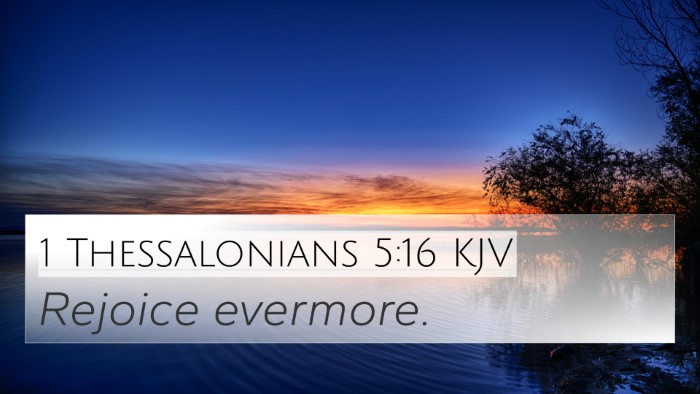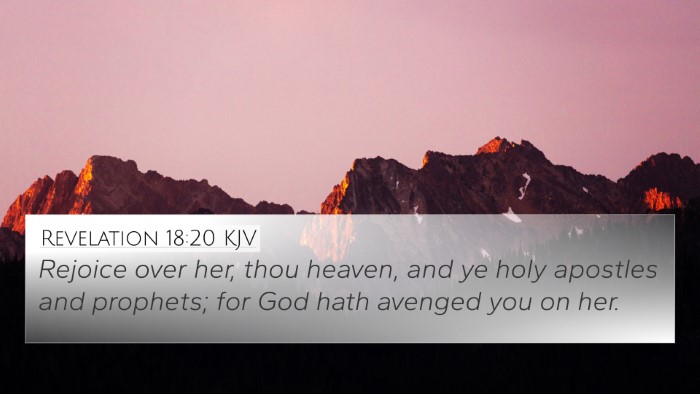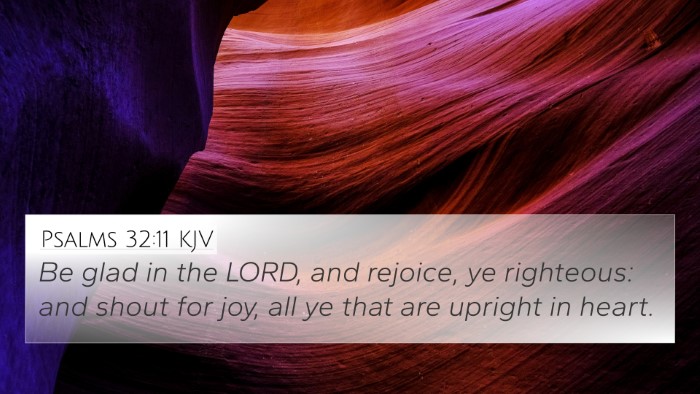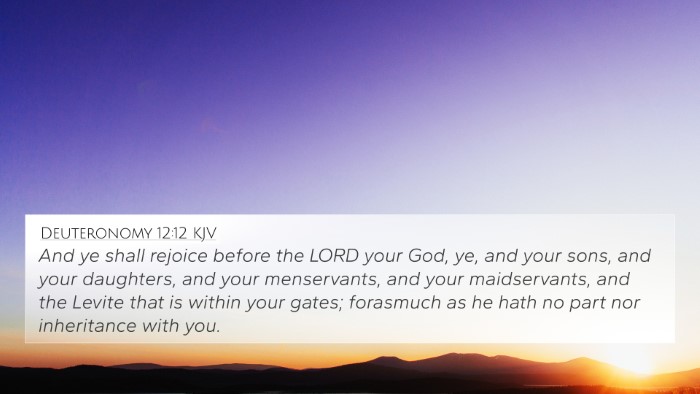Psalms 68:3 - Explanation and Interpretation
Bible Verse (Psalms 68:3): "But let the righteous be glad; let them rejoice before God; yes, let them rejoice with gladness."
This verse from Psalms emphasizes the joy that the righteous feel in the presence of God. The psalmist calls for an expression of gladness and rejoicing among those who are just and faithful. This insight shows the relationship between righteousness and a positive response to God’s presence.
Meaning and Interpretation
This passage can be analyzed through various public domain commentaries to understand its deeper implications. Below are key points derived from Matthew Henry, Albert Barnes, and Adam Clarke:
Matthew Henry's Commentary
Henry reflects on the joy that is intrinsic to the saints of God. He notes that this happiness is a natural reaction to God’s presence and goodness. The righteous should not only feel joy but should also express it outwardly through praise and worship. He emphasizes the theological basis for joy as a result of God's goodness and grace.
Albert Barnes' Commentary
Barnes elaborates on the concept of righteousness and how it demands a response. He asserts that those who walk in accordance with God's laws are deserving of gladness. This gladness is rooted in a confident faith that God is present and active in their lives. He encourages believers to embrace their identity as the righteous and to rejoice as an expression of their faith.
Adam Clarke's Commentary
Clarke adds that the call to rejoice is not solely an emotional response but a deliberate choice that reflects one’s understanding of God’s character and actions. He notes the importance of acknowledging God's past deliverance as a basis for rejoicing. This theme reflects a larger biblical principle where the joy of the Lord is a source of strength for believers.
Thematic Connections
This verse serves as a foundation for understanding several significant biblical themes:
- Joy in God's Presence: The righteous are called to rejoice, indicating that a relationship with God naturally leads to joy.
- Righteousness and Joy: There is a direct correlation between leading a life of righteousness and experiencing authentic joy.
- Praise as a Response: Joy is often expressed through praise, emphasizing the importance of worship in a believer's life.
- Community Celebration: The verse suggests a communal aspect of rejoicing among the faithful, indicating shared faith experiences.
Bible Verse Cross-References
To deepen your understanding of Psalms 68:3, consider the following cross-references that relate to this passage:
- Psalms 100:2: "Serve the LORD with gladness; come into his presence with singing." - Reflects the theme of joy in serving God.
- Psalms 97:12: "Rejoice in the LORD, you righteous, and give thanks to his holy name." - A direct call for the righteous to rejoice.
- Psalms 32:11: "Rejoice in the LORD and be glad, you righteous; sing, all you who are upright in heart!" - Similar encouragement to the righteous.
- Isaiah 61:10: "I will greatly rejoice in the LORD; my soul shall be joyful in my God..." - A prophetic joy in God.
- Philippians 4:4: "Rejoice in the Lord always; again I will say, rejoice!" - New Testament parallel urging joy as a constant state.
- Nehemiah 8:10: "For the joy of the LORD is your strength." - The relationship between divine joy and personal strength.
- Romans 14:17: "For the kingdom of God is not a matter of eating and drinking, but of righteousness, peace, and joy in the Holy Spirit." - Highlights the qualities of God's kingdom.
Tools for Bible Cross-Referencing
To deepen your study and understanding, the following tools can assist in finding cross-references and thematic connections:
- Bible Concordance: A comprehensive index of biblical words and phrases.
- Bible Cross-reference Guide: Tools designed to highlight relationships between verses.
- Bible Reference Resources: Online tools and books that provide cross-referencing materials.
- Cross-reference Bible Study: Methods to explore how different scriptures interact and support each other.
- Bible Chain References: Systematic approaches to link verses thematically.
Inter-Biblical Dialogue
Understanding Psalms 68:3 also includes examining how it dialogues with other scriptures to produce a richer theological tapestry. The connections made between the Old and New Testaments underscore the continuity of God’s redemptive message and the persistent call for His people to rejoice based on His nature and promises.
Conclusion
The verse Psalms 68:3 not only encourages personal rejoicing among the righteous but invites a broader communal response rooted in the understanding of God’s goodness. The joy of the Lord is central to the believer's life, serving as a powerful testament to the transformative nature of faith. As you continue your study, exploring cross-references helps build a more profound appreciation of these connections and themes throughout Scripture.
















